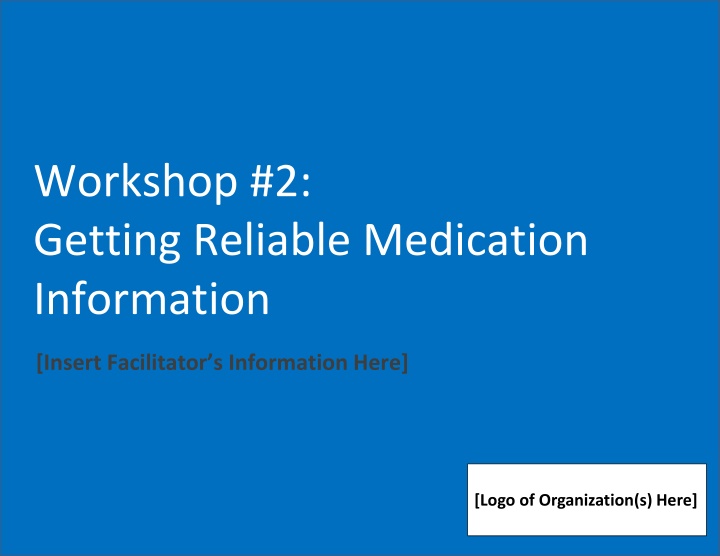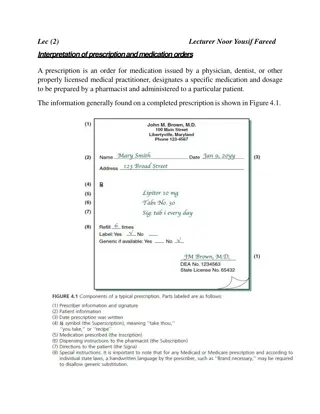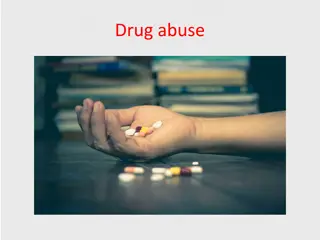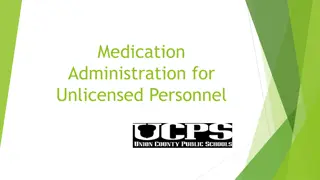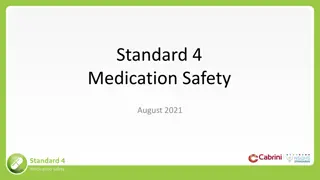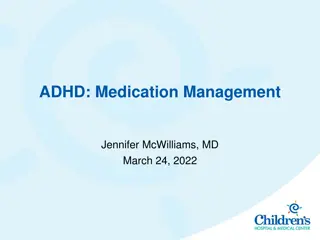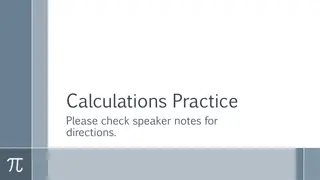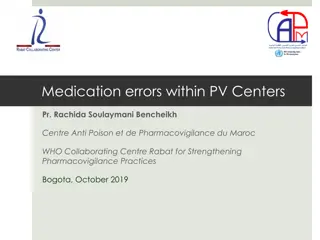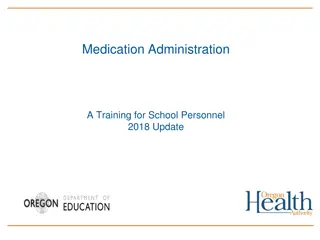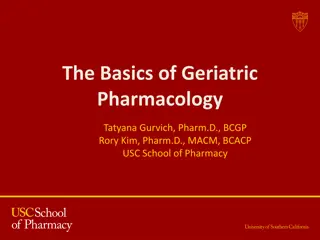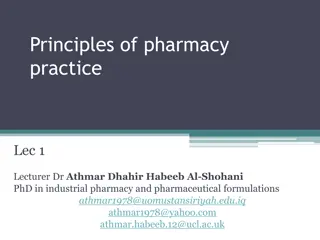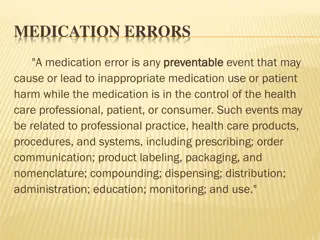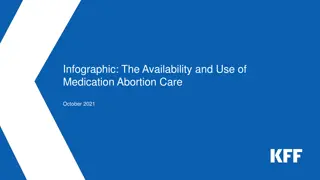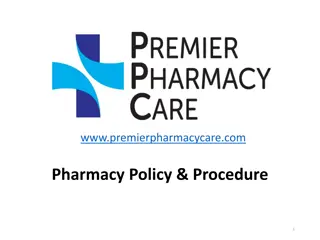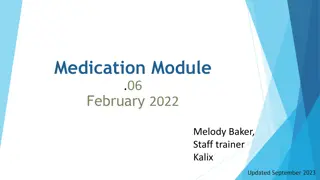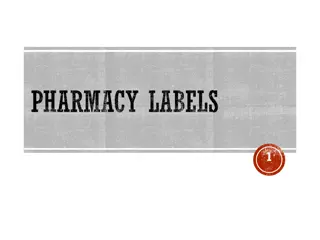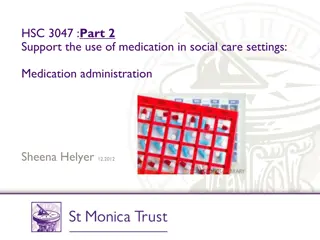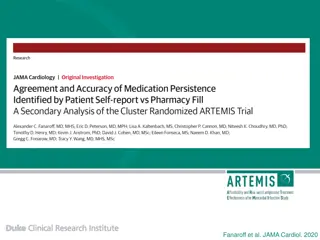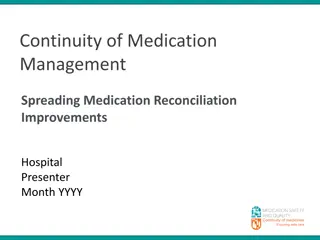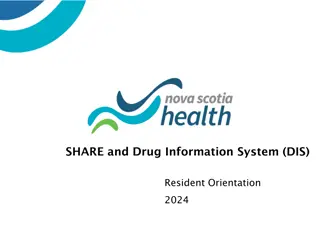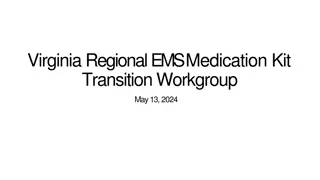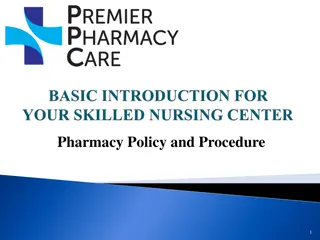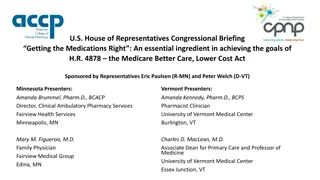Workshop #2: Getting Reliable Medication Information
Join us in Workshop #2 where we focus on acquiring trustworthy medication information. Learn how to describe essential medication details, organize information effectively, and utilize reliable resources for queries. Engage in discussions on medication histories, completing tasks, and exploring avenues for obtaining accurate medication data.
Download Presentation

Please find below an Image/Link to download the presentation.
The content on the website is provided AS IS for your information and personal use only. It may not be sold, licensed, or shared on other websites without obtaining consent from the author.If you encounter any issues during the download, it is possible that the publisher has removed the file from their server.
You are allowed to download the files provided on this website for personal or commercial use, subject to the condition that they are used lawfully. All files are the property of their respective owners.
The content on the website is provided AS IS for your information and personal use only. It may not be sold, licensed, or shared on other websites without obtaining consent from the author.
E N D
Presentation Transcript
Workshop #2: Getting Reliable Medication Information [Insert Facilitator s Information Here] [Logo of Organization(s) Here]
Acknowledgements The development of this workshop series has been supported by The Centre for Aging and Brain Health Innovation (CABHI) and Centres for Learning, Research and Innovation in Long-Term Care (CLRI) at Bruy re Content was originally developed and reviewed by: Pharmacists with the Bruy re Deprescribing Research Team: Pam Howell, Lisa Richardson and Barbara Farrell Research co-investigators: James Conklin and Lalitha Raman-Wilms Community advisory member: Kathryn Mulder
Overview of the series Overall goals: Share information and experiences with polypharmacy , medication management and deprescribing Share ideas on how to find and use the right medication information Help you have useful conversations with health care providers about medications 50
Rules of engagement Confidentiality and privacy Equal opportunities for sharing Respectful conduct 8
What we have done so far: Workshop #1: Polypharmacy Good medication management Deprescribing 51
Todays objectives You will be able to: 1. Describe what you need to know about medications and why it is important 2. Keep track of this information in a way that is organized and easy to use 3. Use reliable medication resources if you have questions 52
How will we do this? Review the pieces for a medication history and why they are important Share what you thought was useful about completing the homework Share challenges you had in completing the homework Share ideas on where and how to find information for a good medication history 53
Reflection Worksheet #1 Important Pieces of Medication History and Experience Information Fill out individual worksheets Worksheets found on pages 54-56 of Participant Workbook 54
Remember what doctors have told us It is challenging for them to keep up to date records about a patient s medications Information that is important to keep track of and share with them includes: The reason for taking the medication How long the medication has been taken General feelings about taking the medication 57
Homework discussion What details did you find hard to fill out on the medication chart? Why? Where did you get the information to help fill out the medication chart? What did you like about the way the medication chart is organized? What did you NOT like about the way the medication chart is organized? Do you have another way of keeping track of this kind of medication information? 58
Medication Resources All icons are made and used courtesy of Flaticon.com (https://www.flaticon.com) underCreativeCommons license CC 3.0 BY. 59
What do we mean by reliable medication resources ? Anywhere or anyone trusted to give correct and up to date medication information General tips: Is it written by or an in-person consultation with a health professional (e.g. doctor, nurse, pharmacist)? Is the information current? Is the information the same if you check another resource? 60
Medication information resources: Online Information accessible on the Internet These sources can give you information on: Medical conditions, reason for use, side effects, and drug interactions Reliable sites: Usually end in .org, .gov or .edu Do not have a lot of advertisements in them (they are not trying to make money) Do not make claims that a product can treat all people or any sickness Often have an About Us or Contact page that tells you who wrote the information 61
Wikipedia An online encyclopedia Information is not always trustworthy because: You do not know who wrote the information (are they an expert?) You do not know who reviewed the information (are they an expert?) May not include new research or information Information can be difficult to understand 62
Medication information resources: People Who? Health care providers include your community pharmacist, doctor, nurse practitioner, public health nurse Telehealth Ontario (Toll free:1 866 797 0000) Be careful of information from your family, friends, or neighbours (are they an expert?) Health care providers can give you information on any of the details in the medication chart 63
Beware: Television, radio shows and commercials Often exaggerated information that is not always supported by quality evidence Always talk with your health care provider first (even if it is a doctor or pharmacist sharing the information) 64
Great sources of medication information 1. Your health care provider (e.g. physician, pharmacist, nurse) 2. Medline Plus (www.medlineplus.gov) 65
Lets discuss the information Was it easy to find? Was it easy to understand? Was the information the same in all the resources? Are there any questions you have about this information? Where would you go now to find the answers to your questions? How would you use this information? 67
Homework part 1: Adding to a medication chart Use reliable resources to fill in missing information, add more details about the medication history, and to learn more about the medications 68
Homework part 2: Reflections Fill out the reflectionsworksheet that we can discuss at the next workshop Based on all the medication information you now have: Do you feel the need to have a medication conversation with a health care provider? Why or why not? Why do you want to have this conversation? Who would you have this conversation with? Is there anything that worries you about or might stop you from having this conversation? 69
Information expert: where does your opinion fit (as a patient and/or caregiver)? 70
Overview of the resources listed in your workbook for this session 71
What well do at the next workshop Review the homework Share ideas on how to have useful conversations about medications with health care providers 72
Wrapup Questions? Next session: Contact us: If you have any questions or concerns If you want an electronic copy of the medication chart or resource list 73
